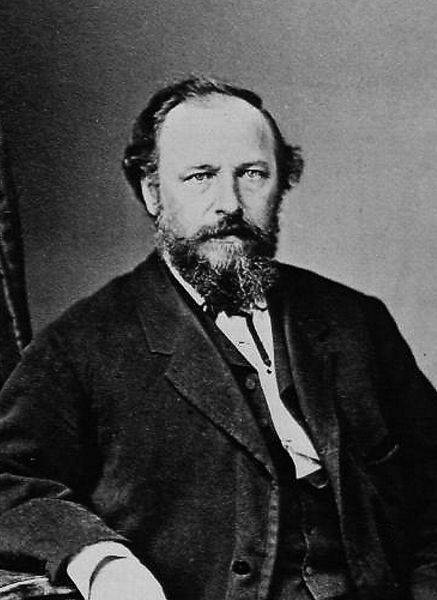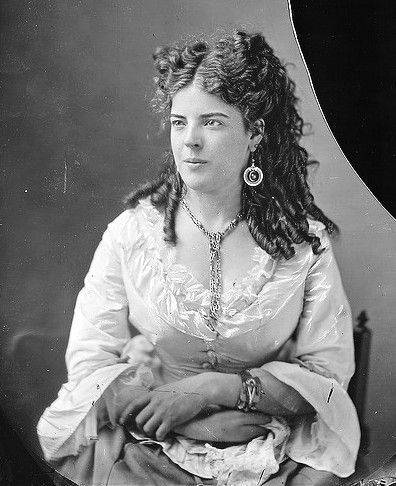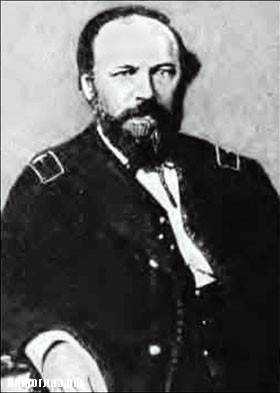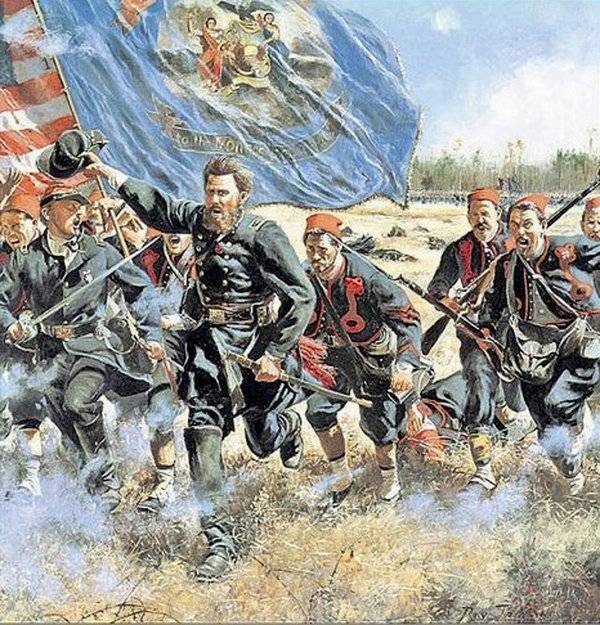Russian American general. The amazing fate of the Don Cossack, a friend of Lincoln

When, in the distant 1822 year on Don, a son of a Cossack by birth and a retired major Vasily Nikolayevich Turchaninov was born a son, Ivan, no one could imagine that after forty years he would succeed not only to rise to the rank of general, but to get him in a foreign army, and even in an army so far away, in those days, from a country like the United States of America. The fact that another representative of the old Cossack clan Turchaninovs will achieve fame in the military arena, in fact, was not surprising. It was a military family in which almost all men fought and served. For example, Pavel Petrovich Turchaninov was promoted to the rank of lieutenant-general in the Russian imperial army and was the closest ally of Mikhail Kutuzov. The rank of lieutenant general was received by Andrei Petrovich Turchaninov, who also participated in the war with Napoleon.
It is clear that the military career was "registered" and Ivan Turchaninov. At ten years old, in 1832, he entered the First Cadet Corps in St. Petersburg, then transferred to Novocherkassk in 1835 - to a military classical gymnasium, and in 1843, at the age of 21, he received a military education at the Mikhailovsky Artillery School. The diligent young officer was assigned to the Imperial Guard and served in the Don Cossack Mounted Artillery Battery Life Guard.
In 1848, a young officer participated in suppressing a popular uprising in Hungary. Then it was precisely for the suppression of this uprising that the European revolutionaries called Nicholas I the “gendarme of Europe”. In 1852, Ivan Turchaninov graduated from the Nikolaev Academy of the General Staff with a silver medal and entered the elite of the Russian imperial army. He participated in the Crimean War 1853-1856. It was Ivan Turchaninov who carried out a topographical survey of the Baltic coast, for which he not only received the order, but was also made a Guards colonel. By 1856, 34-year-old Colonel Ivan Turchaninov served as chief of staff of the corps in Poland. It seemed that his further military career would be unclouded - for a few more years and the colonel could well rise to the rank of general in the Russian imperial army.
 However, Ivan Vasilievich Turchaninov was not an ordinary officer. In addition to his own military career, he was also interested in the future of Russia. Turchaninov thought a lot about which form of political and social structure would fit the Russian state. It is known that he was in correspondence with Alexander Herzen himself. For the Colonel of the Guard, and even at that time, it was very unusual and risky. Turchaninov criticized serfdom and believed that Russia should take the path of democratization. Apparently, in the end, he realized that further he needed to either leave the country, or, sooner or later, he would simply be arrested. In 1856, Colonel Ivan Turchaninov left the Russian Empire with his wife Nadezhda.
However, Ivan Vasilievich Turchaninov was not an ordinary officer. In addition to his own military career, he was also interested in the future of Russia. Turchaninov thought a lot about which form of political and social structure would fit the Russian state. It is known that he was in correspondence with Alexander Herzen himself. For the Colonel of the Guard, and even at that time, it was very unusual and risky. Turchaninov criticized serfdom and believed that Russia should take the path of democratization. Apparently, in the end, he realized that further he needed to either leave the country, or, sooner or later, he would simply be arrested. In 1856, Colonel Ivan Turchaninov left the Russian Empire with his wife Nadezhda. A young political emigrant from Russia arrived in the United States of America. Here he changed his name - now the Russian colonel, immediately after leaving dismissed from the Russian military service, was called Mr. John Basil Turchin, and his wife - Mrs. Nadine Turchin. At first the Russian émigré tried to take up farming, but quickly went bankrupt, after which he entered the engineering school, and his spouse received an education in a medical school. Having been in the role of an American student and graduated from college, the former Russian colonel began working as an engineer on the Illinois Railroad. The man who was part of the Russian military elite began his career in the USA at 34-year-old and practically from scratch. However, as a talented specialist, here too the Russian officer found a use for himself and won the respect of the Americans. John Turchin quickly became close with representatives of the “high society”, for example, he personally met lawyer Abraham Lincoln.
Turchaninov traveled to America under the influence of idealistic ideas - many Russian liberals and democrats of that time saw in the United States an example of almost the best state. But, faced with the American realities, Turchaninov rather quickly became disillusioned with the political and social structure of the United States. He reported this in his letters to Herzen. Turchaninov saw colossal social inequality, permissiveness for the rich, a high crime rate. All this went against the notions of life in North America that prevailed in democratic circles. And, nevertheless, Turchaninov did not regret that he came to America - here he, as he himself reported in one of his letters, became a “mere mortal”, an ordinary person — an engineer.
When the war began between the northern and southern states, Ivan Turchaninov could not stay away from such large-scale military and political events. He decided to use his military experience and filed a petition for admission to the army of the northern states. As the American army experienced a great shortage of qualified commanders, the former colonel of the Russian imperial army, and even personally acquainted with Lincoln, was immediately recruited as a colonel and appointed commander of the 19 Illinois Infantry Regiment. So a whole American regiment was entrusted to the Russian emigrant. The soldiers and officers of the regiment had to approve a commander of two candidates - Ulysses Grant and John Turchin. The selection of personnel was made in favor of the Russian officer. Colonel Ulysses Grant, in turn, was appointed commander of the 21 Infantry Regiment. Nadine Turchin was also enlisted for military service - she, as having a medical degree, was appointed a military doctor.

Under the command of Colonel Turchin, the 19 Infantry Regiment of the Illinois quickly turned into one of the most combat-ready units of the American army. After all, Turchaninov was a professional military with an excellent education - Mikhailovsky Artillery School, then - the Academy of the General Staff. There were few such officers in the American army. Turchaninov quickly established excellent discipline, adjusted combat training. In a strict, but fair and talented commander, the soldiers did not like the soul. Soon Colonel Turchin was appointed commander of a brigade of four regiments. Under his command, the team made many glorious feats. At first, the higher command could not rejoice in the success of the brigade commanded by Turchin, however, as the commander grew, he began to play an increasingly independent role.
Therefore, problems in relations between Colonel Turchin and higher-ranking officers of the army of northerners began almost immediately. The Turchin regiment was part of the Ohio army, commanded by Major General Don Carlos Buell. This American officer was one of the few slave-owning generals in the ranks of the army of northerners. He did not see anything reprehensible in the possession of slaves, and it was on this basis that Major General Bewell and Colonel Turchin had a serious conflict.
The fact is that Turchin, who adhered to democratic convictions, provided asylum in the brigade to all negro slaves who ran away from slave owners and turned to him for protection. Dissatisfied slave owners complained to the higher command. Moreover, without an order, Colonel Turchin took Nashville and Huntsville, and in Athens, in Alabama, the soldiers of one of the brigade units still violated discipline and committed looting. By the way, among the southerners, long after the end of the Civil War, there were stories about the “wild Cossack” John Turchin, whose soldiers robbed the local population. In many respects, these stories were due to the fact that the Democrat Turchin really did not experience reverence for the wealthy slave owners and could completely close his eyes to the sins of his subordinates, as well as the blacks - slaves.
On the other hand, all the American officers who dealt with Turchaninov spoke of high education and good manners of the Russian émigré. As for the cases of looting, they occurred in almost all American units - in the army of northerners and in the army of southerners. However, it was Turchin who decided to make a scapegoat - firstly, he was still a “stranger” among the American commanders, and secondly - “the way was crossed” by Major General Buellu himself, who at that time had a great influence in the US military elite. The trial began.
The military court was going to dismiss Colonel Turchin from military service, but Turchin’s long-time friend Abraham Lincoln, by this time the former president of the United States, intervened. He gave John Turchin the rank of brigadier general of the American army. After that, Turchin was inviolable to the court, since the jury, who had the rank of colonel, could not dismiss the general. So the only Russian general of the American army remained in its composition. At the same time, Abraham Lincoln delivered Turchin from further problems by removing Major General Don Carlos Buell from his post. By this time, Buell was seriously suspected of sympathizing with the Southerners, so they decided to remove from the command post. From other posts, Buell refused and in the 1864 year he resigned from military service altogether.

The Turchin Brigade distinguished itself in the battles of Chicamog and Chattanooga. 19-20 September 1863, the forces of the northerners suffered a serious defeat from the Confederates and began to retreat. With this valiant Turchin could not accept. He personally led the counterattack of his brigade and, breaking through the defense line of the southerners, he was in their rear. The Turchin Brigade made a brilliant raid in the rear, capturing the 300 soldiers and officers of the Southerner’s army and seizing several artillery pieces. The attack was named after the fearless general "Turchinskoy attack in the rear of the enemy." It was under this name that she entered the American history textbooks.
Turchin repeatedly distinguished himself in the Battle of Chattanooga, where he also personally led the attack of his brigade. The personal courage of Brigadier General Turchin and the dedication of his wife, the doctor Nadine Turchin, helped to make the Russian emigre couple into the real darlings of American servicemen. Turchin tried to take care of his soldiers as much as possible and was very worried after the 17 disaster of September 1862, when the train carrying the personnel of his brigade fell from the bridge over the Beaver Creek in Indiana. Killed 25 soldiers and 1 officer, 114 people were injured. After that, Turchin, lamenting, said that these were the most numerous losses of his brigade during the whole period of hostilities. By the way, besides the direct command of the troops, Turchin at that time also managed to conduct scientific work - to study tactics, to write the work “Brigade Training”, which was later recognized as the best similar composition of that time. Overload affected the health of the 42-year-old. In 1864, he was struck with a heart attack. His health condition no longer allowed Turchin to remain in command, and he was forced to resign from military service.
John Turchin returned to civilian life. He settled in Chicago, where he worked as a construction engineer, and later engaged in real estate trading in southern Illinois. In 1873, Turchin even founded the Polish colony of Radom in Illinois, where he began to invite Polish immigrants. While in the civil service, he wrote works on the history of the American Civil War. Over the years, Turchin began to yearn for his homeland. He even wrote a letter to Emperor Alexander II with a request to allow him and his wife to return to the Russian Empire, but the response of the Russian authorities was categorical - to refuse to return to their homeland. The financial situation of the elderly Turchin and his wife deteriorated. Only thanks to the activity of former subordinates who served in the "Turchinskaya" brigade, the legendary participant in the Civil War began to pay a small pension. The exploits of General Turchin in the United States during the life of the commander were not appreciated.
In 1901, 79-year-old John Turchin died in Ann's hospital in Illinois. Three years later, Nadine Turchin passed away. The couple are buried in a military cemetery in Mount City in Illinois, and their graves are kept, as befits the graves of American military personnel, at the expense of the United States of America.
At present, the figure of an amazing man — a Russian officer who has become a general of the American army — is becoming increasingly interesting both in the United States and in Russia. Moreover, many essays on military history, written by Turchaninov - Turchin, have not lost their relevance even now.
Information